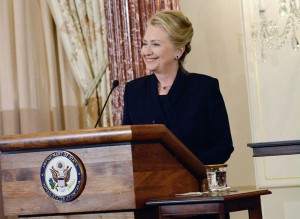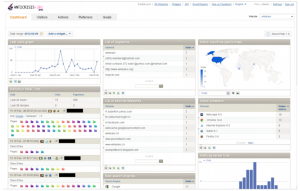The WikiLeaks Deterrent Theory, AKA the Arbitrary Official Secrets Act
Three outlets yesterday — first the WaPo, then CNN, then NYT — reported that DOJ is considering charges against Julian Assange and WikiLeaks. The discussion of what charges, and for what leaks, differs between the reports.
While mentioning the Vault 7 leaks, WaPo also focuses on Chelsea Manning’s leaks and Assange’s discussions about how to gain access.
In March, WikiLeaks published thousands of files revealing secret cyber-tools used by the CIA to convert cellphones, televisions and other ordinary devices into implements of espionage. The FBI has made significant progress in the investigation of the leak, narrowing the list of possible suspects, officials said. The officials did not describe WikiLeaks’ exact role in the case beyond publishing the tools.
Prosecutors are also reexamining the leaks from Chelsea Manning, the Army soldier who was convicted in 2013 of revealing sensitive diplomatic cables. Manning chatted with Assange about a technique to crack a password so Manning could log on to a computer anonymously, and that conversation, which came up during Manning’s court-martial, could be used as evidence that WikiLeaks went beyond the role of publisher or journalist.
Alexa O’Brien tweeted out some thoughts and links to what any further prosecution of the Manning leak might entail.
CNN, which is the most certain charges have already been drawn up, explains that DOJ believes WikiLeaks’ actions changed in nature with Edward Snowden.
The US view of WikiLeaks and Assange began to change after investigators found what they believe was proof that WikiLeaks played an active role in helping Edward Snowden, a former NSA analyst, disclose a massive cache of classified documents.
I think that may be demonstrably true of Sarah Harrison, who helped a fugitive escape. But I’m not sure the US has equally compelling evidence against Assange.
Perhaps the most interesting discussion comes from NYT, which discusses the ongoing debate — with “senior Justice Department officials … pressuring prosecutors” over what is realistic and what authorities actually want, which is an Espionage conviction.
The official, speaking on the condition of anonymity because the details of the discussions remain secret, said senior Justice Department officials had been pressuring prosecutors in the Eastern District of Virginia to outline an array of possible charges against Mr. Assange.
But the official said prosecutors remained skeptical that they could pursue the most serious charges, of espionage, with regard to the documents Mr. Assange disclosed years ago with the help of an Army intelligence analyst, Chelsea Manning. Ms. Manning was convicted and sent to prison, but President Barack Obama commuted her sentence in January.
Given how few people Trump has confirmed into positions in government, these outlets should be a bit more descriptive. In that passage, for example, and the following from WaPo, what does “senior justice department official” mean when US Attorney Dana Boente is (as I’ve noted but none of these stories do) also acting DAG and acting AG for any Russia-related charges.
Prosecutors in recent weeks have been drafting a memo that contemplates charges against members of the WikiLeaks organization, possibly including conspiracy, theft of government property or violating the Espionage Act, officials said. The memo, though, is not complete, and any charges against members of WikiLeaks, including founder Julian Assange, would need approval from the highest levels of the Justice Department.
Would Boente be approving charges filed under Boente’s name?
Though that may not matter. Rod Rosenstein, who will become DAG shortly, has himself pursued excessive charges in leak cases, both against Thomas Drake and Hal Martin.
Perhaps the most interesting claim is that the FBI thought indicting Assange — who likely won’t be prosecuted in any case unless Ecuador suddenly changes their mind about their house guest — would provide some kind of deterrent effect.
Officials have said that the F.B.I. supports prosecuting Mr. Assange. Several years ago, the agency sent a series of documents to the Justice Department outlining charges that investigators claimed to have evidence to support. At the time, F.B.I. counterintelligence agents believed that charging Mr. Assange would deter him from posting new troves of American documents.
I think you’d have to be daft to think prosecuting Assange would deter him from posting more, assuming this happened while he was in the Ecuadoran Embassy. Prosecuting him would only mean he’d have less to lose — and, frankly, more reason to post things that might please America’s adversaries, like Russia.
But it might serve as deterrence for other publishing outlets that aren’t holing up in an Embassy. Short of some really distinguishing actions (and Harrison’s might amount to that in the Snowden case), indicting Assange would put everyone else with a SecureDrop on notice that they, too, might be prosecuted. Surely, DOJ would pick and choose who gets prosecuted. They might choose other easily easily targeted people — people who are gay, people who no longer live in this country, people who have too many dogs — to similarly make examples of (though pity the fool that challenges Glenn Greenwald’s First Amendment rights.
DOJ wants to start cutting away at the First Amendment. All the better for them, if in the name of prosecutorial discretion, Jeff Sessions’ DOJ could pick and choose which publishers’ speech gets curtailed.




